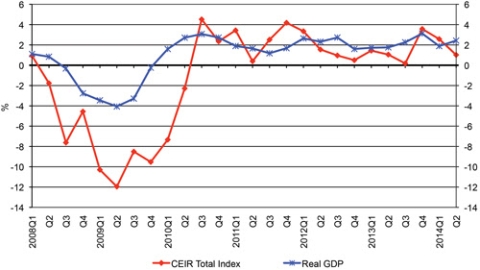Center for Exhibition Industry Research Index Report: 2Q Shows 1 Percent Overall Trade Show Industry Growth

The trade show industry grew by 1 percent in the second quarter of 2014, marking the sixteenth quarter of consecutive growth, according to the CEIR Index Report released today in a room filled with C-level executives at the CEIR Predict Conference in Chicago.
All four metrics tracked by the index posted year-on-year gains, with the strongest performance in Real Revenues, which rose 1.4 percent.
The growth of the exhibition industry lagged behind GDP during the second quarter of 2014, a reversal of the previous two quarters.
"Overall, the second-quarter results show a meager gain of 1.0 percent; the underlying reasons for performance can be attributed to weak exhibition performance in the construction, business, education and non-profit exhibitions sectors" said CEIR's economist Allen Shaw, Ph.D., chief economist for Global Economic Consulting Associates, Inc.
The sectors leading in performance to-date in 2014 are Food, increasing 6.2 percent; Discretional Goods and Services (CS), increasing 5.4 percent; and Communications and Information Technology (IT), increasing 4.3 percent.
Conversely, the Education and Non-profit (ED) sector declined by 3.5 percent, which is attributed to retrenchment of state and local government expenditures. The Raw Materials and Science (RM) sector also declined by 0.6 percent, even though fundamentals remained sound during the same period.
As an objective measure of the annual performance of the exhibition industry, the CEIR Index measures year-over-year changes in four key metrics to determine overall performance: Net Square Feet of Exhibit Space Sold; Professional Attendance; Number of Exhibiting Companies; and Gross Revenue.
The CEIR Index provides exhibition industry performance across 14 key industry sectors: Business Services; Consumer Goods; Discretionary Consumer Services; Education; Food; Financial, Legal and Real Estate; Government; Building, Construction, Home and Repair; Industrial/Heavy Machinery and Finished Business Inputs; Communications and Information Technology; Medical and Health Care; Raw Materials and Science; Sporting Goods, Travel and Entertainment; and Transportation.
For a full report on the CEIR Predict Conference that TSNN Editor-in-Chief Rachel Wimberly attended, please click HERE.


Add new comment